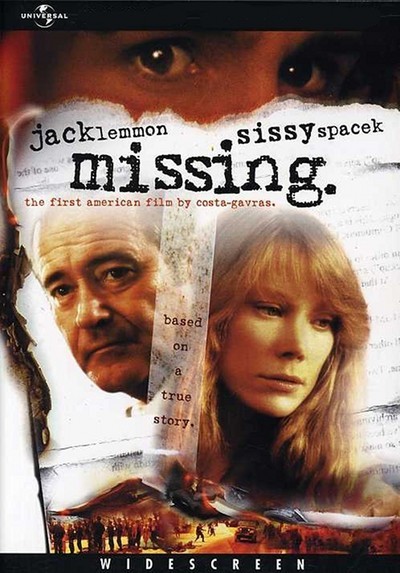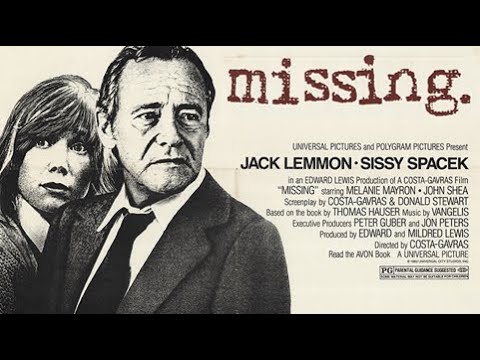'Missing' as a Civic Education Tool
6/3/20254 min read


'Missing' and Its Historical Context
The 1982 film 'Missing,' directed by Costa-Gavras, is a profound cinematic exploration of the political turmoil and human rights violations in Chile during the reign of dictator Augusto Pinochet. Based on true events surrounding the disappearance of an American journalist, Charles Horman, the film sheds light on the complexities of political dissent and the quest for truth in a repressive regime. It serves as a critical tool for civic education, encouraging audiences to engage with historical narratives that shape contemporary societies.
Narrative and Themes: The Call for Justice
At its core, 'Missing' presents a harrowing tale of love, loss, and the relentless pursuit of justice. The film follows the journey of Horman's father, Ed Horman, and wife, Beth, as they navigate bureaucratic obstacles in their search for Charles. The emotional weight of the narrative highlights the heartbreaking reality faced by families of the disappeared, giving personal context to political chaos. This juxtaposition between personal stories and broader political implications serves as an essential civic education lesson, urging viewers to recognize the importance of standing up against oppression.
The Film as a Civic Education Tool
Civic education is paramount in fostering informed and engaged citizenry. 'Missing' effectively encapsulates this principle by urging audiences to reflect on issues such as government accountability, the importance of free press, and the implications of political apathy. Through its portrayal of state-sponsored violence and the quest for truth, the film encourages viewers to question their own roles in a democratic society. It frames personal narratives within global contexts, teaching vital lessons about the importance of civic participation and the responsibility individuals hold toward advocacy and justice.
As we reflect on the legacy of 'Missing,' it becomes evident that the themes explored are not confined to a specific time or place. The film continues to resonate with contemporary challenges concerning human rights and political accountability across the globe. For educators and advocates alike, 'Missing' remains a significant touchstone in the discourse surrounding civic education. By engaging with this film, we not only honor the memories of those who suffered under oppressive regimes but also reinforce the necessity for vigilant activism in the preservation of democratic values.
About Costa-Gravas
Costa-Gavras, born Konstantinos Gavras in 1933, is a Greek-French filmmaker known for his politically charged films. He gained international recognition with Z (1969), a thriller based on the assassination of Greek politician Grigoris Lambrakis, which won the Academy Award for Best Foreign Language Film. His 1982 film Missing, starring Jack Lemmon and Sissy Spacek, won the Palme d'Or at Cannes and an Academy Award for Best Adapted Screenplay.
Costa-Gavras often explores themes of political oppression, corruption, and human rights violations. His other notable films include State of Siege (1972), The Confession (1970), Music Box (1989), and Amen. (2002). He has been a strong advocate for cinema as a tool for political discourse.
Awards for Missing:
Missing received significant recognition and accolades. Here are some of the notable awards:
Cannes Film Festival (1982): Won the prestigious Palme d'Or, sharing the award with Yol, and Jack Lemmon won Best Actor.
Academy Awards (1983): Won Best Adapted Screenplay and was nominated for Best Picture, Best Actor (Jack Lemmon), and Best Actress (Sissy Spacek).
BAFTA Awards (1983): Won Best Film Editing and received nominations for Best Actor (Jack Lemmon), Best Actress (Sissy Spacek), Best Direction, and Best Film.
Golden Globe Awards (1983): Nominated for Best Motion Picture - Drama, Best Director, Best Actor (Jack Lemmon), Best Actress (Sissy Spacek), and Best Screenplay.
Understanding the Film and Its Message
The Criterion Collection offers a DVD containing informative interviews and presentations with several key players.
Costa-Gavras describes how the movie was made and critical decisions involved.
Joyce Horman, wife of Charles Horman, speaks of her experiences in Chile, adding context to the film.
Pursuing Truth is a video essay with Peter Kornbluh, author of The Pinochet File examining the work to gain access to declassified documents concerning the 1973 military coup in Chile and the case of Charles Horman
Producing Missing goes into the politics involved in getting the project going with producers Edward and Mildred Lewis and Sean Daniel, and Thomas Hauser, author of The Execution of Charles Horman, the film's source.
In Honor of Missing is a video of the 2002 Charles Horman Truth Project event honoring the twentieth anniversary of Missing, with actors Sissy Spacek, John Shea, and Melanie Mayron
1982 Cannes Film Festival French Television Interviews Costa-Gavras, Jack Lemmon, Ed Horman (father of Charles), and Joyce Horman.
Who Would Care About Us If We Disappeared?
Michael Wood, Princeton English professor and film critic explores the relevance of Missing in an article accessed here: https://www.criterion.com/current/posts/704-missing-who-would-care-about-us-if-we-disappeared
Following is an AI generated summary of the essay:
·Political Thrillers with a Personal Touch: Wood argues that Costa-Gavras's films are not just political thrillers but deeply personal stories. The political intrigue is not a backdrop but an integral part of the characters' lives and struggles.
Blurring Fiction and Reality: The essay highlights how Missing fictionalizes real events while maintaining a strong political message. Costa-Gavras avoids explicitly naming Chile in the film, yet the setting and events unmistakably reference the 1973 Chilean coup.
Universal Political Relevance: Wood emphasizes that the film's themes extend beyond Chile. By not directly identifying the country, Costa-Gavras suggests that similar injustices can—and do—happen elsewhere, making the film's message globally relevant.
The Power of Ambiguity: The essay discusses how Costa-Gavras uses ambiguity to engage viewers. The film does not provide easy answers but instead forces audiences to confront uncomfortable political realities.

